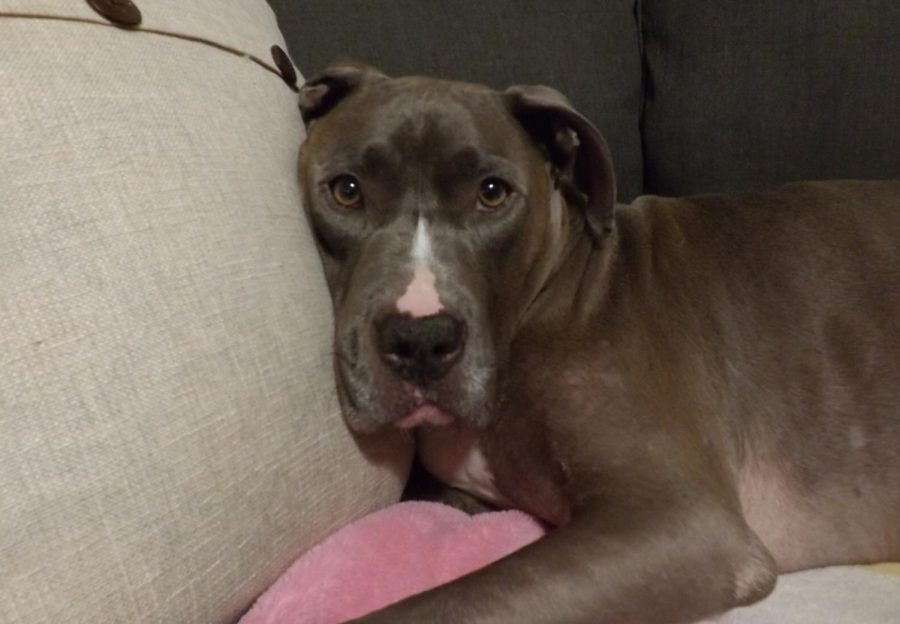Our poor pitbulls and pitbull mixes are being persecuted just for existing (Opinion)
Today, purebred dogs and mixes with Pitbull characteristics are being taken from their families and, in many cases, killed
Bolt, a Pitbull dog mix, cuddles on the couch as he lays his head on a pillow.
Ever since I was a baby, my furry companions have been part pitbull, except for one German shepherd mix. I have known these dogs to be some of the most caring animals I have ever met. My family’s first pitbull mixes were harassed when my parents were in college so that some lady could get money from my then 20-something-year-old parents. This woman would walk by everyday with her dog (a dog that she bought for this very purpose) to make my old dogs angry, trigger an attack, and get money from her planned violence. This made one of my dogs forever traumatized until she later passed away from cancer.
Pitbulls are constantly mistreated just because of the history of horrible, abusive people that forced them to fight. There is a law (yes, an actual law) that bans pitbulls and other sweet dogs in many towns and cities here in Colorado. In some places if your dog even remotely looks like a Pitbull it will be taken and sometimes euthanized. This is severe discrimination towards dogs. Dogs — for crying out loud — the sweetest creatures on Earth.
Before the election, Denver tried to pass a law taking away the ban, but it was vetoed by their mayor, Michael Hancock. The new law would still have a few restrictions on pitbulls, according to KKTV 11 News. If they were to do this, it would defeat the whole purpose of getting rid of the ban in the first place. What exactly are the laws saying?
“In 2004, the Colorado State legislature passed a statute increasing the penalties and liability for dog attacks and prohibiting any legislation based on breed. This law effectively repealed all pit bull breed bans in Colorado. However, the City and County of Denver contested the law claiming they were a ‘home rule’ city and the state legislature could not dictate local ordinances such as dog breed bans,” said Animal Rescue of the Rockies.
Very recently, after the 2020 election, the Denver ban was taken away with the help of measure J2. According to the Denverite website, “Owners [will] need to register their dogs with the city, pay a fee, provide the city with an emergency contact, and include a description of the dog and proof of vaccination. It [places] a limit of two dogs per household. If the dog doesn’t have any violations for 36 consecutive months, it would be allowed to register in the city like any other dog.” Though this is a lot to take in and may feel a little restricting, at least it is a step in the right direction. Other cities may take a cue from Denver.
There are five main cities and towns in Colorado that ban and or place weighted restrictions on the ownership and homes of pitbulls: Aurora, Commerce City, Fort Lupton, Lone Tree, and Louisville. Like most of these places, the Denver ban pertains to the American pit bull terrier, American Staffordshire terrier, and the Staffordshire bull terrier. These are all different names for pitbulls. The only ones that are safe are “public exhibitions”, dogs that are part of contests, sponsored, and dogs that only travel through the city. Aurora, Commerce City, and Fort Lupton all share similar notions as well. Sadly, Lone Tree is against more than just pitbulls. They are against the American bulldog, dogo argentino, canary dog, presa mallorquin, tosa inu, cane corso, and the fila brasilairo. Louisville discriminates against any dog that remotely resembles a pitbull.
It makes my heart ache to see so many dogs being put to rest just for existing.
Denver started up the pitbull ban in May of 1989. It is known today that the crime rate was exceedingly high in the 1980s. Dog fighting was and still is illegal today. This was a place where humans abused certain dogs and forced them to fight. People enjoyed dog brutality and would bet on fights for fun. Imagine how much crime was going on during this dog fighting time. Imagine how many more insufferable maniacs were out doing illegal crimes, like dog fighting, in the 80s compared to today. This law was a response to the crime spark in America, but do we really need it anymore? I mean, right now, my rolly, lazy pitbull mix is napping on our couch as I’m typing. Yeah, sure— he would definitely attack me once he lazily wakes up, and waddles over. Totally.
The first “job” that pitbulls were given was to be thrown into a blood sport called “bull baiting”. The dogs were then trained by people to cling onto a ring on the bulls’ nose. The crowds laughed, cheered, and gambled as small pitbulls were flung many feet into the air. This was basically like a Roman Colosseum that spectators watched, enjoying the sight of abused dogs being hurled into the sky. According to Bark Post, bull baiting was outlawed in 1835 in the UK and other places soon after that.
The public then moved on to throwing the dogs into pits full of rats to chase and kill, along with dog fighting, because these acts were easier to hide from the police. Though these dogs were originally trained to fight, they were also bred to be friendly and kind. These dog owners didn’t want the dogs to attack them, only other dogs. Dogs that did retaliate against their abusive owners were killed.
Through the years, pitbulls were taken out of the pits and sent to help with farming, protecting the family, and watching over children. I know what you’re thinking — What? I thought pitbulls were “violent”! But it turns out, dogs are only as violent as what their owners train them to be, much like people. In most cases, dogs learn from their owners, just like children learn from their parents. They are often raised to behave in the way that their guardians do.
One ten year-old-child from Aurora jumped a fence and was attacked by a pitbull. Another pitbull in the yard tried to save this boy and pull him away. Many debating the subject of restricting pitbulls bring up this event. This boy, now in his 20s, is upset that no one ever asked his opinion on the matter. When interviewed in 2018, he said, “‘My opinion on it[?] I love pits. It wasn’t the pit’s fault at all.’” One pitbull had issues with aggression and violence, while another tried to save a young child. Hmm, maybe dogs are individuals, and shouldn’t be placed into stereotypical groups, after all — how absolutely shocking. Not.
In fact, even with the negative propaganda, “84 percent of Americans believe citizens should be allowed to have any breed of dog they choose,” says the Best Friends Animal Society.
When pitbulls and other dogs are given the chance, they make very good and friendly companion dogs. In fact, according to a Dog Time article, pitbulls were ranked as being one of the least likely dogs to show aggression. They ranked similarly to the household favorite, the golden retriever. Though it may shock many, “Pitbulls were less likely to show aggression than beagles, bulldogs, basset hounds, bichon frise, corgis…” and many, many more dog breeds.
Throughout history, these dogs have been the babysitters of children around the world. Pitbulls have been given many names, but none are more famous than the “Nanny Dog”. Many have claimed this to be a myth, but there is more and more photographic evidence today that proves the true motherly gentleness of pitbulls. Babysitting seems to be the true calling for these animals, not violence. Pitbulls are very tolerant with young children. These dogs are very playful around kids and will often check up on them when they are feeling upset. I know from personal experience, as a five-year-old, that they will put up with the chaotic behavior of a small child. Little five-year-old me would “remold” their face, squeeze them with hugs, and poke them again and again. Pitbulls are some of the most tolerant dogs that I’ve met. “[Pit]bull puppies prefer human company to their mother’s, two weeks before all other dogs… and they feel as much pain as any other breed (accidentally step on one’s toe and you’ll see),” says the Adopt a Pet adoption website.
Many communities are trying to take action on this matter. Some try to get in touch with government officials, who are there to represent the people. We can all write letters expressing our concerns to these officials, such as the different city mayors and the council members. Many voices can create an immense impact.
The public has also created a replacement law in Castle Rock. This agreement holds the owners to a higher responsibility in training their dog because, after all, it really is the owner who teaches the dog how to respond to life experiences. Any dog that may be showing signs of violence can be brought to court. This gives the dog a chance for rehabilitation or to live somewhere else. Many are hoping that other cities will follow the example of Castle Rock and remove the ban that persecutes our pitbulls. Many are hoping that other cities will follow the example of Castle Rock and Denver to remove the ban that persecutes our Pitbulls.
For me, it was quite hard to find ways to help end this ban. I’m a teenager with no connections or power in this situation. I live in a small town that has no problem with pitbulls. I wondered how I could even help these poor dogs. But many have already worked (and are still working) hard to express their voices on the matter, and in doing so, some officials have listened and responded, while others haven’t.
Remember, one form of action that we can all take is to not give up on these dogs. Let’s all try to find ways to lead our government towards understanding that these are not monsters, but just innocent, sweet-hearted dogs.
Your donation will support the student journalists of Mead High School. Your contribution will allow us to purchase equipment and cover our annual website hosting costs.

Skylar Whalen is a senior. She is this year's editor-in-chief. Skylar enjoys painting, singing, and playing softball. She is a huge animal lover and works with dogs outside of school. Skylar plays competitive softball and hopes to play in college. She is excited to help other writers succeed and grow. Skylar can’t wait to work with new people and produce engaging stories for the community around her. She also enjoys having the excuse to write about herself in third person and make her seem interesting.

Marina Goter is a Senior. She enjoys writing, watching TV, and hanging out with family. Marina is a gymnastics coach and does a lot of volunteer work. She is excited to lead the newspaper this year and help others write articles.
You can contact her at [email protected].












petanimalwildlife • Mar 16, 2022 at 4:52 am
The [url=https://www.petanimalwildlife.com/Senegal parrot/]Senegal parrot[/url] belongs to the family of birds recognized for their exceptional pet quality, tranquillity, and remarkably peaceful temperament.
zoie • May 3, 2021 at 9:39 am
thank you so much for brining light to this for people. I grew up with a pitbull mix and she was the sweetest to me even when I as a 3 year old sat on her back
C. BERKENKOTTER • Nov 22, 2020 at 8:43 am
Good points, especially indicating that dogs will be what the owners train them to be. Unfortunately, as you stated this breed has been targeted as a vicious breed. Hopefully thru articles like yours, the public can listen and take action on the be half of the pit bull. Nice job on your article.